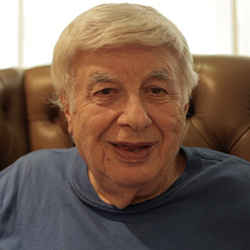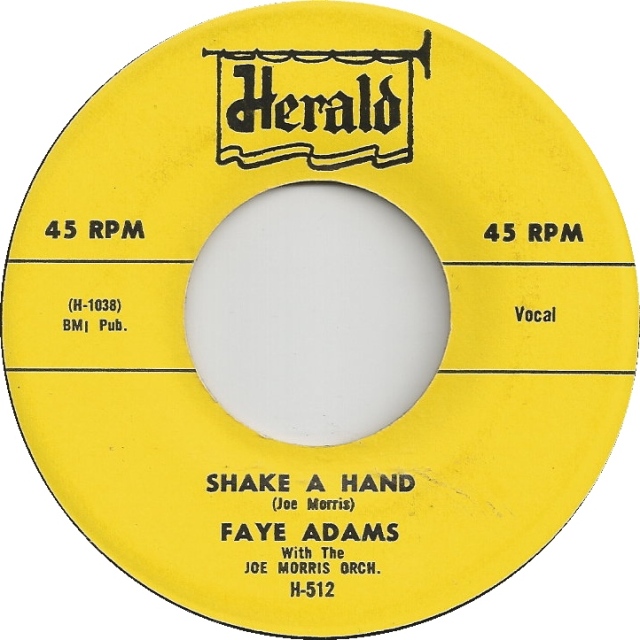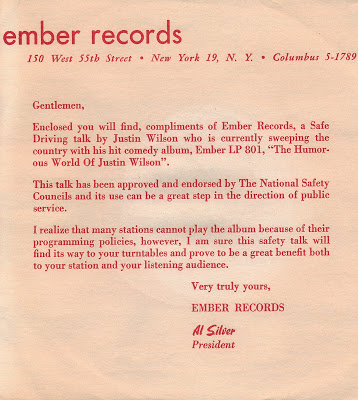
In Pt.1 Jeffrey recalled his early life and the creation of the Flamingo Club in a basement room of the Mapleton Hotel, assisted by Tony Hall. Now we move seamlessly on!
Tony (Hall) was writing for various papers and he came to me one day and said ‘Listen, I’m going to join Decca as an A&R man for their Tempo label.’ So I said to him ‘Who are you going to record? Let’s record all these guys (the musicians he was booking at the Flamingo) Let’s do a series whereby on every record you put “Recorded at the Flamingo” or “by arrangement with the Flamingo” and maybe then we can open two or three nights a week’ So you’ll see that the first jazz stuff on Tempo was by everybody that worked at the Flamingo.

Then I started to manage the jazz artists because I didn’t want them to go back to Studio 51, and in order to do that I had to guarantee them three nights work a week because if they could only one or two they would play Feldmans and Studio 51. So I organised them, but where the hell am I going to put them (to play)? So I started an agency. I called Ted Heath and said ‘look, it’ll be cheaper for you.’ and his wife Moira put a ‘Jazz at the Flamingo’ unit on as support to Ted, costing £5 a man insteaad of paying Johnny Dankworth £150. Ted is the draw anyway and they always sold out. He used to do the regular Sunday Night at the London Palladium. That’s how we started. I sent ‘Flamingo’ units all around the country – it didn’t matter what they paid me as long as it said in big type on the posters By Arrangment with Jeff Kruger’s Jazz at the Flamingo. Then we started recording. I then get a call from the BBC. ‘We would like to use your guys on Jazz Club, you’re the manager. So I went to Aolian Hall and sat down with them and they said ‘Thursday night we’re on the air from 8-10pm.’ OK, that didn’t affect the club. I said ‘Well, I want a credit.’ ‘The BBC don’t give credits’. ‘Well, you don’t get any of my musicians.’ ‘You can’t do that.’ I said ‘why not?’ Anyway, that’s how I started to get my reputation as a tough bastard!
And you were working to get the club open more nights a week?

It went to Saturday & Sunday; it went to Friday, Saturday & Sunday. Then we opened the Florida Club across the street at the Cafe Anglais next to the Odeon, Leicester Square. That took 600 people to deal with the overflow. I started to be able to offer the guys three days a week, but then I did what the (musicians’) union didn’t like – and certainly Studio 51 and The Feldman didn’t like – I put an exclusive clause in there. ‘You work for me or you work for them. You work for them, you never work for me. That means you don’t record and you don’t go on the air on any of my programmes.’ And I built up this agency that represented most of the jazz stars. The BBC then agreed to say ‘by arrangement with‘ and I stipulated that in each interview they must mention the club. To be fair, they did! So I was building up an image for the club. At the end of the second Jazz Club recording, the producer Johnnie Stewart said to me ‘right, can you fill in these PRS forms.’ ‘What’s PRS?’ (this is 1952) ‘Performing Rights Society. Don’t you understand that every time your guys play these original songs we need the publisher.’ ‘Crombie, who wrote that song”‘ ‘I did’ ‘Sign this bit of paper’. ‘Why?’ ‘I’m going to get you money.’ ‘What do you get?’, which is a musician’s first question. ‘Every £1 I get, you get 50p and I get 50p.’ ‘Oh, that’s OK’ Crombie signed, Bill LeSage signed, Dankworth signed. So I built up a jazz publishing company and got into the publishing business before I realised what I was doing. At that point Tony (Hall) said ‘Right, we’re doing the first sessions at Tempo. I’m going to use Tubby Hayes…what are we going to record?’ ‘You can record this lot, or the boys can write new sstuff.’ Now I’d learnt there was such a thing as mechanical payment, so I became more interested in publishing and brought in Rik Gunnell to compere and run the all-nighters when they started. My parents took on the physical running of the club, the collection of the money and so forth. We ordered the Coca Colas and became the single biggest Coke user in London. We booked all the musicians, mainly from our own in-house people. Always fighting the union who were always saying ‘it’s a monopoly.’ and I would say to them ‘Hey, these guys have never had it so good. They are now working three days a week, not standing outside the Windmill Theatre looking for gigs. I’m doing recordings with them; they’re being paid union scale.’ But they didn’t like the monopoly.

Didn’t you recognise it as a monopoly?
No, I didn’t know what the word meant. I was protecting the Flamingo. We started to record and I could see that when the Tempo catalogue came out, of the first 20 things on there, 18 were mine. So I said to Tony ‘In order to expand my publishing I’m going over to America to see if I can pick up some more publishing catalogues.’ I picked up Angel Music Inc. from Al Silver and Doug Moody, whose main businesses were Ember and Herald Records. They had hit after hit. In 1953 when I started talking to them, they had Shake a hand with Fay Adams which was No. 1 on the R&B charts


Then, in 1957 I got them to actually sign an agreement whereby I represented their publishing and we got The Joker by Billy Myles – a No. 1, Lee Allen’s Walking with Mr Lee, The Mello Kings‘ Tonight Tonight, Fred Parris and the Satins’ In the Still of the Night – all top five R&B charts hits, and I’m the publisher, so I’m building up an R&B catalogue, my first move away from jazz, although when I first heard the music I heard it as jazz – the same riffs – and I’m meeting all these great guys…Screaming Jay Hawkins…all of these kind of people, and picking up all their publishing. Then I said to Tony ‘I’ve got records here – I’ve got to do something about them.’

So I went to see Sir Edward Lewis at Decca, got as far as his right hand man Bill Townsley; couldn’t get beyond him, and he said ‘I’m not putting you in the record business.’ I said ‘Hold on, I’m not asking you to put me in the record business; I want to licence to you for your London label’ (which I’m not sure had started then). And the reason I went to Decca first was that every morning I travelled up with Beecher Stevens, who was their head of promotion, and we started to talk. All I wanted was to get a record out – I didn’t realise what records were – to protect my publishing. They threw me out. I went to Philips, then threw me out. Morris Levy (Oriole Records), loveable man, said ‘Look, I’m concentrating on my Embassy line with Woolworths. I don’t know what I’m going to do with it but I’ve got this Tamla Motown label, well, Tamla and Motown,’ he said. ‘It’s terrible music. I don’t know what I’m going to do with it, but this man Gordy came to see me and nobody else would take it, so I’ve got it.’
So I thought, well, there’s no point going to EMI. They’re the giants, I wouldn’t get through the door. Who’s the boss of EMI, L.G. Wood or Sir Joseph? I’ve forgotten, but that’s the way I thought. His (L.G. Wood) secretary, who was a lovely lady said ‘You need to see L.G. Wood.’ I thought, ‘God, how am I going to get to see him? It’s taken me months to get to Lockwood on the phone, never mind anything else.’ So I wrote a little note to L.G. Wood. ‘Come up and see me.’ So I went up to see him and he said ‘What have you got in mind?’ I said ‘Look I’ve got this Ember label’ – by this time I had signed a deal with Al Silver that I represented Ember for the world outside America. We’d formed Ember Records International Ltd. on a 50/50 basis and he (Al) was too busy hiding his money away and making everything he touched turn to gold. Hit after hit after hit. He didn’t put a thing out that didn’t chart, or if it didn’t chart it sold more down in Louisiana and those kind of places, he didn’t care if it didn’t show on the charts. Everything he did was touching six figures and in those days that was heavy. And his father-in-law owned the pressing plant, adn they had the publishing. They didn’t know what day it was for counting money.

So I explained my theory to Len Wood and he said ‘This is novel; they’ve (Decca) started their London label. Wally Ridley is very staid on the HMV label – I don’t think that’s your cup of tea, but would you allow us to release them on Parlophone or Columbia, at our election, but we’ll give you a credit ‘Licensed from Ember Records?’ So I said ‘Well, yes, but I was kind of thinking about having an Ember label.’ ‘That we’re not going to do. We’re not going to put you in business that way but we will release the product and you can pick what you want released, but you’ll have to work with one or other of our A&R men.”Who are they?’ ‘Norrie Paramor or George Martin – do you mind if I get them into the meeting?’ In they came. Wally Ridley was against it – he didn’t want anyone usurping his recordings of Alma Cogan or whoever. George and Norrie listened to the music and thought ‘This is great; we can’t reproduce those sounds here; do we get a promotion budget? etc.etc.’ ‘We’ll discuss that when Mr Kruger has gone. But in principle what do you think?’ ‘We love it.’ So the deal was done whereby Ember Records International was licensed to EMI through Len Wood, and the first releases came out on Parlophone, a couple on Columbia and I worked with George and Norrie.
Phew! You will notice I’ve asked very few questions! Still 24 pages to go, and I’m enjoying the transcription. I need someone to tell me the early Ember Int releases on Parlophone or Columbia.
Text ©David Hughes 2017. Images courtesy Google searches are for illustration purposes only.